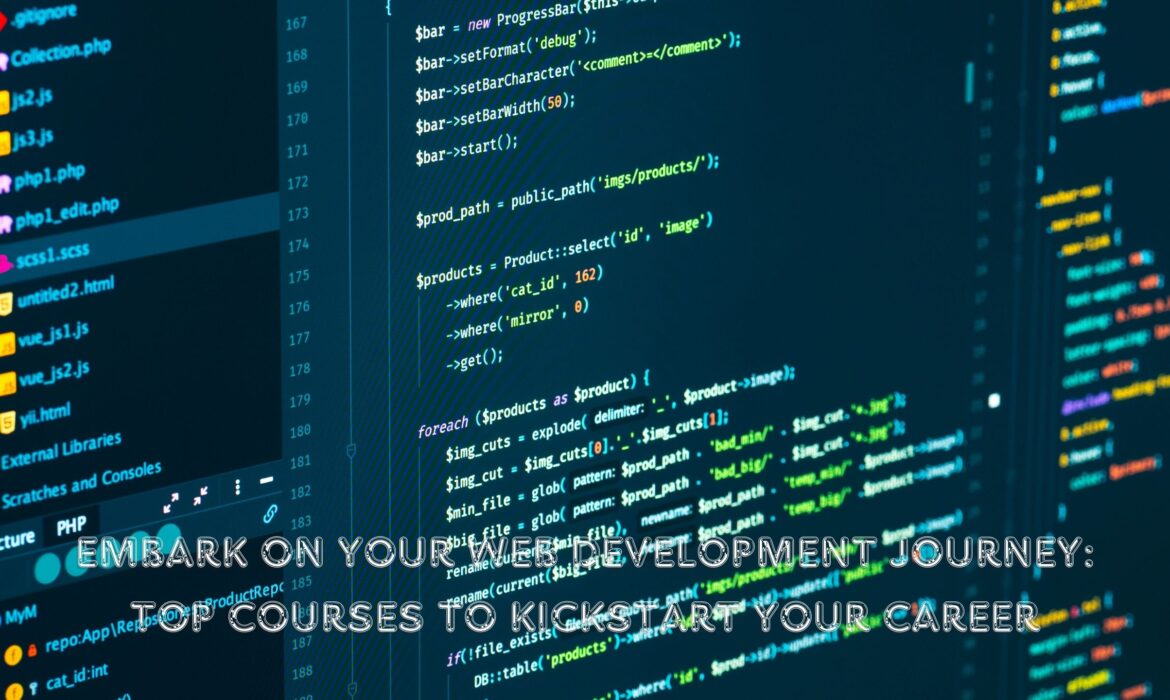
Introduction to Web Development
To embark on a journey in web development, it’s essential to understand the basics of this field. Let’s explore what web development is and why it holds great importance in today’s digital world.
What is Web Development?
Web development refers to the process of creating websites and web applications. It involves the use of programming languages, frameworks, and other tools to build the structure, design, and functionality of websites. Web developers work on both the front-end and back-end aspects of a website, ensuring that it functions smoothly and delivers an optimal user experience.
Front-end web development focuses on the visual elements of a website that users interact with directly. It involves writing code in languages like HTML, CSS, and JavaScript to create the layout, design, and interactivity of web pages. The goal is to ensure that the website is visually appealing, responsive, and user-friendly. Learn more about front-end web development.
Back-end web development, on the other hand, involves working with server-side technologies and databases to handle the behind-the-scenes functionality of a website. Web developers use programming languages like Python, Java, or PHP to build the logic and functionality that power the website. They work on tasks such as data management, server configuration, and integration with external systems. Discover more about back-end web development.
Importance of Web Development
Web development plays a crucial role in today’s digital landscape. Here are a few reasons why it holds great importance:
-
Online Presence: In the modern age, having an online presence is essential for businesses, organizations, and individuals. A well-designed website allows you to showcase your products, services, or talents to a global audience.
-
E-Commerce: Web development enables the creation of e-commerce websites, which have revolutionized the way people shop. From online marketplaces to individual stores, e-commerce websites provide convenience and accessibility to both businesses and consumers.
-
Communication and Information Sharing: Websites serve as a platform for communication and information sharing. Whether it’s news websites, social media platforms, or educational portals, web development enables the creation of interactive and dynamic platforms for people to connect and share knowledge.
-
Career Opportunities: The field of web development provides numerous career opportunities. As businesses and organizations continue to rely on websites and web applications, the demand for skilled web developers continues to grow. Explore various web development jobs available in the industry.
-
Technological Advancements: Web development is constantly evolving, with new technologies and frameworks emerging regularly. Staying updated with the latest trends and tools allows web developers to create innovative and cutting-edge websites that meet the needs of modern users.
Understanding the fundamental concepts and the significance of web development sets the stage for an exciting and fulfilling career in this field. In the following sections, we will explore popular programming languages, key concepts, and essential skills required for web development.
Popular Programming Languages for Web Development
When it comes to web development, having a strong foundation in programming languages is essential. There are several popular programming languages that are widely used in web development. In this section, we will explore three of the most common ones: Python, JavaScript, and HTML/CSS.
Python for Web Development
Python is a versatile and beginner-friendly programming language that is often taught in web development courses. It offers a clean and readable syntax, making it easier for developers to write and maintain code. Python’s extensive library ecosystem also provides a wide range of frameworks and tools that facilitate web development tasks.
Python is particularly well-suited for back-end web development, where it is used to handle server-side processes and database interactions. Popular web frameworks such as Django and Flask are built on Python, offering developers robust and efficient solutions for building web applications. To learn more about Python’s role in web development, check out our article on Python web development.
JavaScript for Web Development
JavaScript is another widely used programming language in web development. It is a versatile language that allows for dynamic and interactive elements on web pages. JavaScript is primarily used for front-end web development, enabling developers to create engaging user interfaces, handle client-side logic, and interact with web APIs.
JavaScript has been the most popular programming language for web development for eight consecutive years, according to StackOverflow’s Developer Survey in 2020. Its popularity is driven by its ability to enhance user experiences through features like form validation, animations, and real-time updates. To delve deeper into JavaScript and its role in web development, visit our article on front-end web development.
HTML and CSS for Web Development
While not traditional programming languages, HTML and CSS are fundamental languages for web development. HTML (Hypertext Markup Language) is used to structure the content of web pages, while CSS (Cascading Style Sheets) is responsible for the visual presentation and layout.
HTML provides the basic building blocks of a web page, defining elements such as headings, paragraphs, images, and links. CSS, on the other hand, allows developers to control the appearance of these elements, including styling, positioning, and responsiveness. Understanding HTML and CSS is crucial for any web developer, as they form the backbone of every web page. To explore more about responsive design and the importance of HTML and CSS in web development, check out our article on responsive web design.
By mastering these popular programming languages, aspiring web developers can gain the necessary skills to create dynamic and visually appealing websites. Whether you choose Python for its versatility, JavaScript for its interactivity, or HTML/CSS for their foundational role, each language has its own unique benefits. As you embark on your web development journey, consider exploring resources and courses that focus on these languages to enhance your skills and expand your opportunities in the field.
Key Concepts in Web Development
To understand web development better, it’s important to familiarize ourselves with key concepts such as front-end development, back-end development, and full-stack development.
Front-End Development
Front-end development focuses on the user interface and user experience of a website or web application. It involves the creation and implementation of the visual elements that users interact with on the client-side of the application. Key technologies used in front-end development include HTML, CSS, and JavaScript.
HTML (Hypertext Markup Language) is the standard markup language for creating the structure and content of web pages. CSS (Cascading Style Sheets) is used to control the layout, appearance, and styling of the web pages. JavaScript enables interactivity and dynamic behavior on the client-side, allowing for enhanced user experiences. Front-end developers work on creating responsive and visually appealing websites that are accessible across different devices and screen sizes.
For in-depth knowledge on front-end development and its related skills, refer to our comprehensive article on front-end web development.
Back-End Development
While front-end development handles the client-side, back-end development deals with the server-side of a website or web application. Back-end developers focus on the logic and functionality that powers the application, ensuring that it functions smoothly and efficiently.
Back-end development involves server-side programming languages like Python, Ruby, PHP, and Java, among others. These programming languages enable developers to create the server-side logic, handle data storage and retrieval from databases, and integrate external services and APIs. Back-end developers work on building the underlying infrastructure that supports the front-end of the application.
To explore more about back-end development and the skills required, visit our detailed article on back-end web development.
Full-Stack Development
Full-stack development encompasses both front-end and back-end development, providing a comprehensive understanding of building web applications. Full-stack developers have the skills to work on both the client-side and server-side of a web application, allowing them to handle the entire development process.
By being proficient in both front-end and back-end technologies, full-stack developers can effectively communicate and collaborate with other team members involved in different aspects of web development. They have a holistic understanding of the development process and can take on various roles, making them versatile and valuable assets in the industry.
To learn more about full-stack development and the benefits it offers, refer to our informative article on full-stack web development.
Understanding the key concepts in web development is vital as it helps you choose the right path and acquire the necessary skills for your career. Whether you decide to specialize in front-end, back-end, or pursue full-stack development, each area plays a crucial role in creating robust and engaging web applications.
Benefits of Learning Web Development
When it comes to web development courses, there are numerous benefits to gaining knowledge and skills in this field. Web development offers a wide range of opportunities, a growing demand for professionals, and high salary potential.
Job Opportunities in Web Development
Learning web development opens up a world of job opportunities. In today’s digital age, businesses of all sizes require an online presence, and web developers play a crucial role in creating and maintaining websites. Whether it’s working for a web development agency, a tech company, or as a freelancer, the demand for skilled web developers is ever-increasing.
According to U.S. News and World Report, web development was ranked as the eighth-best job in the tech industry, with a median salary of over $73,000 a year (edX). This demonstrates the promising career prospects that await those who choose to pursue web development as their profession. For more details on specific job opportunities, you can explore our article on web development jobs.
Growing Demand for Web Developers
The demand for web developers is expected to continue growing in the coming years. As businesses increasingly rely on digital platforms, there is a need for professionals who can build and maintain websites, web applications, and online platforms. According to predictions, the demand for qualified web developers is set to increase by 13% over the next decade, resulting in the creation of over 25,000 new jobs by 2030 (edX).
By learning web development skills, you position yourself at the forefront of this growing industry, ensuring a stable and rewarding career path. Stay updated with the latest technologies and trends to remain competitive in the job market.
High Salary Potential in Web Development
Web development offers high salary potential, making it an attractive career choice. The median salary for web developers exceeds $73,000 a year, as reported by U.S. News and World Report (edX). However, it’s important to note that salaries can vary depending on factors such as experience, location, and specific skills. By continuously improving your skills and gaining expertise in specialized areas like front-end web development, back-end web development, or responsive web design, you can increase your earning potential.
Web development offers a combination of creativity and technical skills, providing a fulfilling and financially rewarding career path. As you gain experience and develop a strong portfolio, you can even consider freelancing or starting your own web development business.
In conclusion, learning web development can lead to exciting job opportunities, a growing demand for professionals, and high salary potential. By acquiring the necessary skills and staying updated with the latest technologies and trends, you can embark on a successful career in web development.
Web Development Courses and Platforms
To embark on your web development journey, it’s important to find the right courses and platforms that suit your learning style and goals. There are numerous resources available that offer comprehensive web development courses. In this section, we will provide an overview of web development courses, introduce some top platforms for web development courses, and highlight the web development courses available on Coursera.
Overview of Web Development Courses
Web development courses cover a wide range of topics, from the fundamentals of HTML and CSS to advanced concepts like full-stack development and responsive design. These courses are designed to equip learners with the necessary skills and knowledge to build websites and web applications. By enrolling in web development courses, you can learn programming languages, gain hands-on experience, and explore different aspects of web development.
Top Platforms for Web Development Courses
When it comes to finding reliable platforms for web development courses, there are several options to consider. These platforms offer a variety of courses taught by industry professionals, allowing you to learn at your own pace and choose the subjects that interest you the most. Some of the top platforms for web development courses include:
| Platform | Description |
|---|---|
| Coursera | Coursera offers a wide range of web development courses, including both beginner and advanced level courses. These courses cover various aspects of web development, such as HTML, CSS, JavaScript, front-end development, back-end development, and full-stack development. Some of the web development courses on Coursera are taught by top instructors from leading universities and institutions around the world. Coursera offers both self-paced courses and courses with a set schedule, allowing learners to choose the learning format that best suits their needs. Completion of web development courses on Coursera can lead to valuable certifications, which can boost career prospects in the field of web development. (Coursera) |
| Udemy | Udemy is another popular platform that offers a wide range of web development courses. These courses are created by independent instructors and cover various programming languages, frameworks, and tools used in web development. Udemy courses often provide practical exercises and projects to help learners apply their knowledge in real-world scenarios. |
| Codecademy | Codecademy focuses on interactive learning, allowing learners to practice coding directly in their web browser. The platform offers courses on HTML, CSS, JavaScript, Python, and more. Codecademy courses typically include quizzes, coding exercises, and projects to reinforce learning. |
| FreeCodeCamp | FreeCodeCamp is a nonprofit organization that provides free web development courses. The platform offers a comprehensive curriculum that covers HTML, CSS, JavaScript, responsive design, and more. FreeCodeCamp also emphasizes hands-on projects and encourages learners to contribute to real-world coding challenges. |
Coursera Web Development Courses
Coursera, in particular, offers a wide range of web development courses that cater to learners of all levels. These courses are designed by top instructors and institutions, ensuring high-quality content and a comprehensive learning experience. By enrolling in web development courses on Coursera, you can gain a solid foundation in web development, explore different programming languages, and learn the latest industry practices.
Some of the popular web development courses available on Coursera include:
- HTML, CSS, and JavaScript for Web Developers by Johns Hopkins University
- Full-Stack Web Development with React by The Hong Kong University of Science and Technology
- Python for Everybody by University of Michigan
- Responsive Website Development and Design by University of London
By completing web development courses on Coursera, you can earn valuable certifications that showcase your skills and enhance your career prospects in the field of web development.
Whether you choose Coursera or other platforms, enrolling in web development courses is a great way to kickstart your career in web development. These courses provide a structured learning path, practical exercises, and opportunities to connect with a community of learners. So, explore the available options, choose the courses that align with your goals, and embark on your web development journey with confidence.
Essential Skills for Web Developers
To excel in the field of web development, acquiring the right set of skills is crucial. Whether you specialize in front-end development, back-end development, or aspire to become a full-stack developer, there are several essential skills you should possess. Let’s explore some of these key skills in more detail.
Front-End Development Skills
Front-end development focuses on the visual and interactive elements of a website. Employers are looking for web developers with a strong foundation in HTML, CSS, JavaScript, and other front-end languages and frameworks (Devry). These skills enable you to create the user interface, design visually appealing layouts, and implement interactive features.
Having expertise in front-end frameworks like React, Angular, or Vue.js can significantly enhance your ability to build dynamic and responsive web applications. It’s also important to stay updated with the latest trends and best practices in front-end development, such as responsive web design, to ensure optimal user experiences across different devices.
Back-End Development Skills
While front-end development focuses on the client-side of web development, back-end development deals with the server-side logic and database management. Back-end developers are responsible for handling data, implementing business logic, and ensuring the smooth functioning of web applications.
Back-end development skills, such as knowledge of server-side languages like PHP, Python, or Ruby, are also in high demand (Devry). Understanding frameworks like Django, Laravel, or Ruby on Rails can streamline the development process and improve your efficiency.
Additionally, familiarity with databases and SQL is essential for back-end developers to design and maintain robust data structures. It’s also beneficial to have experience with CMS platforms like WordPress or Drupal, as these are widely used content management systems.
Responsive Design and Mobile Development
As mobile usage continues to grow, understanding responsive design and having experience with mobile-first development is becoming increasingly important. Responsive design ensures that websites adapt to different screen sizes, providing optimal user experiences on desktops, tablets, and smartphones.
Front-end developers with expertise in CSS frameworks like Bootstrap or Foundation can efficiently implement responsive design principles. It’s important to ensure that your websites are mobile-friendly and perform well across a variety of devices and browsers.
Version Control and Collaboration Skills
Collaboration is an integral part of the web development process, especially when working on projects with multiple developers. Knowledge of version control systems like Git and experience with working in collaborative development environments are essential skills for web developers to have (Devry).
Using version control allows developers to track changes, collaborate seamlessly, and manage code repositories effectively. Familiarity with platforms like GitHub or Bitbucket enables efficient code collaboration, enhances productivity, and facilitates project management.
Database and CMS Knowledge
Understanding databases and SQL is fundamental for web developers, particularly those involved in back-end development. Proficiency in database management systems like MySQL or PostgreSQL allows you to efficiently store, retrieve, and manipulate data within web applications.
Additionally, having experience with CMS platforms like WordPress or Drupal can be valuable assets for web developers. These platforms provide a user-friendly interface for managing website content and customizing functionality without extensive coding.
By developing these essential skills, you’ll be well-equipped to tackle the challenges of web development and thrive in this dynamic field. Remember to continuously learn and stay updated with the latest technologies, frameworks, and tools to remain competitive and deliver high-quality web solutions.
Paths to Becoming a Web Developer
When embarking on a journey to become a web developer, there are various paths you can take to acquire the necessary skills and knowledge. Let’s explore three common paths: web development bootcamps, online web development courses, and traditional degree programs in web development.
Web Development Bootcamps
Web development bootcamps are intensive, immersive programs designed to fast-track your web development skills. These bootcamps typically last around 12 to 24 weeks, providing you with a focused and structured learning experience. The daily classes and hands-on projects help you acquire the necessary skills quickly, allowing you to enter the job market in a shorter period of time (Tech Bootcamps).
Bootcamps are ideal for individuals who prefer an accelerated learning environment and thrive in an immersive setting. These programs often cover both front-end and back-end development, giving you a holistic understanding of web development. By the end of the bootcamp, you should have a portfolio of projects that showcase your skills to potential employers.
Online Web Development Courses
Online web development courses offer flexibility and convenience for individuals who want to learn at their own pace or have other commitments. These courses provide the flexibility to access materials and lectures from anywhere with an internet connection. They cover a wide range of topics, from basic HTML and CSS to more advanced programming languages and frameworks.
One of the advantages of online courses is the ability to choose specific topics or technologies that align with your interests and career goals. You can customize your learning experience and focus on the areas that are most relevant to your desired career path. Online courses often provide video tutorials, interactive exercises, and support from instructors or online communities to facilitate your learning journey.
Traditional Degree Programs in Web Development
Traditional degree programs in web development, such as computer science or web development programs, provide a comprehensive education in the field. These programs are typically offered by universities and colleges and take around 3 to 4 years to complete. While they may require a longer time commitment and can be more expensive, they offer a well-rounded education that covers various aspects of web development.
A degree program allows you to dive deeper into web development concepts and gain a solid foundation in computer science principles. You’ll have the opportunity to study programming languages, algorithms, data structures, and other fundamental topics. Additionally, a degree can provide a broader understanding of technology and critical thinking skills that can be valuable in your career.
Choosing the right path to become a web developer depends on your learning style, availability, and career goals. Whether you opt for a web development bootcamp, online courses, or a traditional degree program, continuous learning and practical experience will play a crucial role in honing your skills. Stay motivated, explore different resources, and keep up with the latest technologies and trends in the ever-evolving field of web development.
Continuous Learning and Staying Updated
In the field of web development, continuous learning and staying up-to-date with the latest technologies and trends are essential for success. The industry is constantly evolving, with new frameworks, tools, and techniques emerging regularly. To remain competitive and provide the best solutions, it’s important to prioritize continuous learning throughout your web development journey.
Importance of Continuous Learning in Web Development
Continuous learning is crucial in web development because it allows you to adapt to the ever-changing landscape of technology. By staying updated on the latest advancements, you can enhance your skills, expand your knowledge, and stay ahead of the competition. Continuous learning helps you:
-
Expand your skill set: Web development encompasses various aspects, including front-end development, back-end development, responsive design, database management, and more. Continuous learning enables you to acquire new skills and explore different areas of specialization, making you a well-rounded web developer.
-
Keep up with emerging technologies: The web development industry is driven by innovation. New programming languages, frameworks, and tools are constantly being developed. By dedicating time to continuous learning, you can stay informed about these emerging technologies and leverage them to create more efficient and modern web solutions.
-
Stay relevant in the job market: Employers seek web developers who are up-to-date with the latest technologies and trends. By continuously learning and updating your skills, you demonstrate your commitment to professional growth and increase your value in the job market. It also opens up opportunities for advancement and career progression.
To facilitate continuous learning, there are numerous resources available such as online courses, tutorials, blogs, and forums. These resources provide valuable insights, guidance, and hands-on experience to help you stay current in the fast-paced world of web development.
Keeping Up with the Latest Technologies and Trends
To stay on top of the latest technologies and trends in web development, you can:
-
Follow industry blogs and publications: Blogs and online publications dedicated to web development provide valuable insights into emerging technologies, best practices, and industry trends. By regularly reading and following reputable sources, you can gain knowledge and stay informed about the latest advancements.
-
Participate in web development communities: Engaging with web development communities, such as forums, online communities, and social media groups, allows you to connect with fellow developers and exchange knowledge. These communities often share updates on new technologies and provide a platform to ask questions and seek advice.
-
Attend web development conferences and workshops: Conferences and workshops offer opportunities to learn from industry experts, gain hands-on experience with new technologies, and network with other professionals. These events showcase the latest trends and provide insights into the future of web development.
-
Experiment with new technologies: Hands-on experience is invaluable in web development. Take the time to experiment with new technologies, frameworks, and tools. Building projects and exploring different approaches will not only enhance your skills but also give you a deeper understanding of their potential applications.
Remember, continuous learning is an ongoing process. Embrace it as an integral part of your web development journey. By staying curious, seeking knowledge, and adapting to change, you can thrive in this dynamic field and deliver innovative and impactful web solutions.
To explore more about the essential skills and paths to becoming a web developer, refer to our previous sections on Essential Skills for Web Developers, Paths to Becoming a Web Developer, and Web Development Courses and Platforms.
Paths to Becoming a Web Developer
If you’re interested in pursuing a career in web development, there are different paths you can take to acquire the necessary skills and knowledge. Each path has its own advantages and considerations, allowing you to choose the one that best suits your learning style and goals. Here are three common paths to becoming a web developer: web development bootcamps, online web development courses, and traditional degree programs in web development.
Web Development Bootcamps
Web development bootcamps offer an accelerated and immersive learning experience for individuals who want to quickly gain the skills needed to become a web developer. These bootcamps typically last around 12 to 24 weeks and provide intensive daily classes and hands-on projects to accelerate learning (Tech Bootcamps). They are designed to provide a comprehensive understanding of web development principles and practices, covering both front-end and back-end development.
One of the advantages of web development bootcamps is the immersive learning environment. By dedicating full-time hours to the bootcamp, you can focus solely on learning the necessary skills without the distractions of other commitments. Additionally, bootcamps often have a strong emphasis on practical experience, allowing you to build a portfolio of projects that demonstrate your abilities to potential employers.
Online Web Development Courses
Online web development courses offer flexibility in terms of schedule and location, making them an excellent option for individuals who prefer a self-paced learning experience. These courses provide comprehensive content and resources, covering various aspects of web development. You can access course materials, video tutorials, and interactive exercises from anywhere with an internet connection (Tech Bootcamps).
One of the advantages of online courses is the ability to learn at your own pace. You can take your time to fully grasp the concepts and practice your skills without feeling rushed. Online courses also often provide access to a community of learners or instructors who can offer support and guidance throughout your learning journey. This path is especially beneficial for individuals who need flexibility due to work or other commitments.
Traditional Degree Programs in Web Development
Traditional degree programs in computer science or web development provide a comprehensive education in the field. These programs typically take around 3 to 4 years to complete and cover a wide range of topics, including programming languages, algorithms, databases, and software development principles. They often include theoretical coursework as well as practical projects to develop your skills (Tech Bootcamps).
One of the advantages of pursuing a traditional degree program is the depth and breadth of knowledge you can acquire. These programs often provide a solid foundation in computer science principles, which can be valuable for understanding the underlying concepts of web development. Additionally, a degree may be preferred by some employers who place importance on formal education credentials.
Whichever path you choose, it’s important to keep in mind that web development is a rapidly evolving field. Continuous learning and staying up-to-date with the latest technologies and trends is crucial for success (Tech Bootcamps). As you embark on your web development journey, consider which path aligns with your learning style, goals, and availability. With dedication and continuous learning, you can develop the skills needed to thrive as a web developer.
- Boost Your Business: Expert Google My Business Ranking Tipsby Freelancertamal●March 1, 2024
- Strategies to Improve Your Website Visibilityby Freelancertamal●February 18, 2024
- Unlocking Success: The Art of Freelance Project Managementby Freelancertamal●January 4, 2024
- Mastering Email Marketing in Rangpur: Secrets to Digital Triumphby Freelancertamal●January 4, 2024










